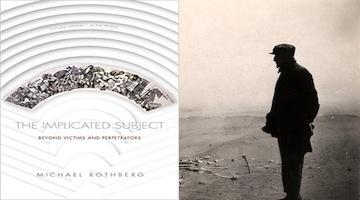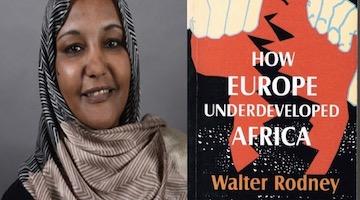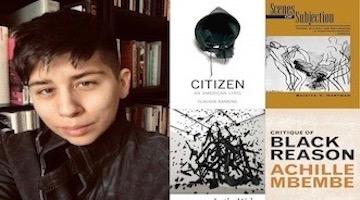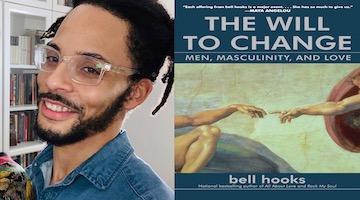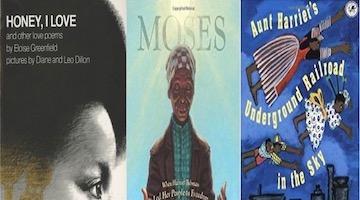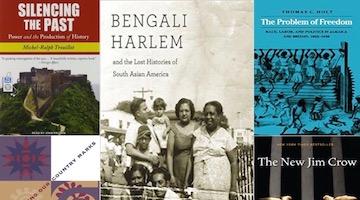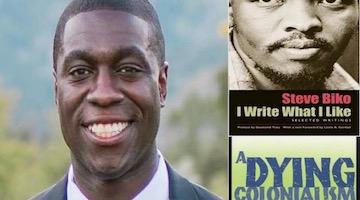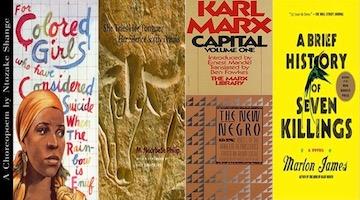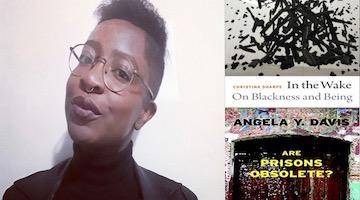Open and constructive dialogue is critical in shaping well-rounded students, including the study of transnational feminism and visual and material culture.
“In order for religious practitioners to comprehend their experiential processes, they must make sense of their senses.”
In this feature, we ask educators to list books they most enjoy teaching in their communities. Contributors include professors, graduate students, artists, journalists, organizers, activists, and other community leaders. Readers of the Black Agenda Report understand that the university classroom isn’t the only place where learning happens. Submissions therefore include lists of books that are taught at community workshops, mosques, churches, prisons, libraries, the local preschool, or even a weekly book study on one’s front porch. This week’s contributor is Dr. Eziaku Nwokocha.
I believe grounding my teaching in transnational feminism and visual and material culture is essential in understanding how religions function in the everyday lives of practitioners (a person who practices a religious tradition), emphasizing the role of religious ritual, labor and possession practices. I intend to cultivate an interactive learning environment that emphasizes open and constructive dialogue between students, developing their ability to engage with religions and cultures outside of their own. I believe this is critical in shaping well-rounded students. My interest in visual and material culture is derived from my training in interdisciplinary studies, which often demands the use of multiple methodologies in order to produce rigorous scholarship, and this has shaped my thinking about teaching. These are some of the books that have been the most inspiring in my work and in the classroom.
Sensational Religion: Sensory Cultures in Material Practice by Salley Promey
To understand visual and material culture, I recommend Salley Promey’s edited volume entitled Sensational Religion: Sensory Cultures in Material Practice. In sensational religion, the senses (touch, smell, taste, sight, sound) are worthy sites of critical analysis in investigating religion and the experience of the body. When the body of a religious practitioner is the focus of study, material and social connections illuminate the behaviors, feelings, and beliefs of people who practice a religion.[i] Just as the body is mutable, growing and aging with time, so too are the materials involved in ritual culture. Sally Promey defines sensation in religion as the multisensory experiences of material objects, the practice of religion in personal experiences, and the circumstances of practitioners’ lives. She argues that sensation in religion is concerned with “embodiment, the senses, and cognition.”[ii] Sense and cognition are symbiotic, rather than mutually exclusive. In order for religious practitioners to comprehend their experiential processes, they must make sense of their senses. This book is an excellent introductory text in religious studies courses.
Electric Santería: Racial and Sexual Assemblages of Transnational Religion by Aisha Beliso-De Jesus
Another book I enjoy teaching is Electric Santería: Racial and Sexual Assemblages of Transnational Religion by Aisha Beliso-De Jesus, because it explored the ways in which media and other visual recordings have expanded the ritual and spiritual transmission of Cuban Santería. These religious recordings speak to the needs of the populations they serve and reinforce ritual power and spiritual knowledge. Providing a historical and ethnographical lens, Beliso-De Jesus examined the everyday lives of transnational practitioners as they used media in their daily religious practices to demonstrate “authentic” spiritual embodiment. These spiritual recordings highlight rituals, drumming, and divination practices. These rituals are shown throughout religious translocal communities in Cuba and distributed to Santería communities in the United States such as New York, Los Angeles, and Miami. Building on the Spanish term la presencias, which emphasized the tactile experience of practitioners’ relationship with “material-immaterial beings” (ancestors, spirits, orisha), Beliso-De Jesus revisited the term copresence, which she described as “active spiritual and religious subjectivities intimately tied to practitioners’ forms of movement, travel, and sensual bodily registers.”[iii] She captured the transnational experiences within the religion and investigated the spiritual and human forms that inhabited these spaces. Beliso-De Jesus’ re-introduction of copresences is helpful in exploring how African religious traditions, like Santería, can be felt on the body.
Religion in the Kitchen: Cooking, Talking, and the Making of Black Atlantic Traditions by Elizabeth Pérez
As the study of African Diasporic religions continues, there are several scholars who are shaping the future of the field by inspecting previously unexplored religious spaces, senses and technologies. Elizabeth Perez’s Religion in the Kitchen: Cooking, Talking, and the Making of Black Atlantic Traditions is significant because she offers analytical attention to an aspect of sensory religions that many scholars before her have merely mentioned, but never concentrated on, which is the “taste” and food preparations in African Diasporic religions, and specifically in Cuban Santería. Her work is crucial because she centers women and gay men’s sensorial work in transforming themselves and food for the Gods. She moves the focus from the spectacular display of ceremony to the meticulous work of meal preparation. Geographically, her work is fascinating because it is located in Chicago, Illinois, a place that scholars have not paid attention to as a site of inquiry because of the limited population of practitioners. Perez’s book is a unique addition in my classroom, because very few scholars of African Diaspora religions within the U.S have paid attention to Diasporic religious traditions that take place in the mid-west of the United States, as opposed to the great amount of scholarship that is centered in New York and Miami.
The Hammer and the Flute: Women, Power & Spirit Possession by Mary Keller
In The Hammer and the Flute: Women, Power & Spirit Possession, Mary Keller investigated Malay religious traditions in Southeast Asia and offered a broadly useful definition of possession as a person being “overcome” with ancestors or spirits and “any complete but temporary domination of a person’s body, and the blotting of that person’s consciousness, by a distinct alien power of known or unknown origin.”[iv] Though the book focuses on Asian religious tradition, I find the concepts she explored useful in analyzing practices in African Diasporic religions, especially regarding possession. Keller used mixed methodologies including the history of religion, feminist theory, and postcolonial theory to critically examine the ways in which scholars of the 20th century analyzed possession with specific attention to gender. Keller challenged 20th century Western scholarly notions of religion, which relegated the phenomena of spirit possession to mere sites of “repressed bodies,” “oppressed sociological bodies,” or “oppressed women’s bodies” that have been afflicted with “hysteria.”[v] Materiality is significant when the body becomes a visual and sensorial vessel during the act of spirit possession within female bodies, because possession is in conversation with social constructions of race, class, and gender. Keller argued that notions of gender and social norms were ascribed to the body through possession. Through possession, people posed social questions and enacted gender performances that signified the expected behavior and social positions of women. These same norms were challenged and investigated by women through the multisensory experience of possession.
Rara!: Vodou, Power, and Performance in Haiti and Its Diaspora by Elizabeth McAlister
To emphasize the idea that the relationship between sensation and faith is built on the performative nature of religious ritual and practice, I recommend Rara!: Vodou, Power, and Performance in Haiti and Its Diaspora, by Elizabeth McAlister. She explored the performative religious rituals of Rara bands in Haiti and the Diaspora. Through rhythmic singing and the choreographed movement of bodies, Rara band performances depend on the simultaneous experience of multiple senses for meaning. Their audiences listen to their music and watch them dance, offering food and water not only for the performers, but to appease the needs and tastes of the gods. Rara bands appeal not only to the culinary appetites of their deities with food and alcohol, but their monetary ones as well, gifting them with their money.[vi] Rara bands contend with religious and political tensions in the public sphere, using their performances to negotiate the connections between their contemporary circumstances and the context of historical memory. McAlister’s book highlighted the multiple senses that are required to analyze the ritual work of African Diasporic religious communities and understand the types of performances that are intrinsic to the study of sensational religions.
At the University of Pennsylvania, I effectively combined my research in visual and material culture and undergraduate teaching, allowing each to complement the other. I taught an undergraduate course at the University entitled, “Religions in the African Diaspora: Divinities, Diviners and Divination.” Through my lectures and active discussion with students, I found that using mixed, multimedia methods was effective in creating an inclusive, critical dialogue about performance and gender in African Diasporic Religions. For example, when I introduced students to Haitian culture, religion and art, I showed the class selected video clips from my research that featured Haitian Vodou practices, such as altar creation and ceremonial dancing. I also brought Catholic statues, Vodou flags, and iron veve (symbols used to represent specific Vodou spirits) for the students to see and touch, providing tactile examples of religious objects to compliment the lecture. I received positive feedback from students who informed me that seeing the videos and the religious objects I brought to class clarified the concepts and rituals we were discussing. Additionally, I presented pictures of how Haitians used Vodou images in their art, music, and tattoos to bolster my argument that Haitian religious practices often intersected with people’s secular, everyday lives. For many students, it was the first time they had been exposed to information about Haiti that was not based on stereotypes or preoccupied with poverty, aid relief, and natural disasters. Teaching, especially through visual and material culture, offers an opportunity to dispel derogatory myths about history, religion, gender and sexuality in the African Diaspora.
Eziaku Nwokocha earned her PhD with distinction in May 2019 in Africana Studies at the University of Pennsylvania. Her fields of focus are Transnational Feminism and Religions in the Americas and she earned certificates in Gender, Sexuality and Women’s Studies; Latin American and Latino Studies; and in College and University Teaching.
COMMENTS?
Please join the conversation on Black Agenda Report's Facebook page at http://facebook.com/blackagendareport
Or, you can comment by emailing us at comments@blackagendareport.com
[i] Sally Promey, Sensational Religion: Sensory Cultures in Material Practice (New Haven: Yale University Press, 2014), 3.
[ii] Promey, Sensational Religion, 1.
[iii] Aisha Beliso- De Jesus. Electric Santeria: Racial and Sexual Assemblages of Transnational Religion. New York, Columbia Press, 2015, pp 2.
[iv] Mary Keller. The Hammer and the Flute: Women, Power, and Spirit Possession. Baltimore: John Hopkins University Press, 2002, pp 4.
[v] Keller, p 3.
[vi] For more scholarship that addresses feeding gods and spirits please see Elizabeth Perez’s work Religion in the Kitchen (2016), which explores multisensory religious experiences in relationship to food and drinks.

